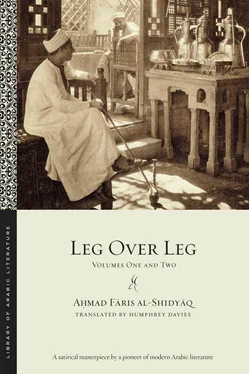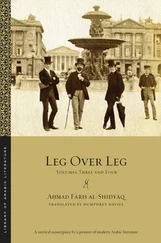Among other such oddities are the rare words, as when I use akhā to describe a man shivering with cold; in the Qāmūs , it states that “ akhā means ‘he warmed the ends of his fingers by blowing on them’.” Further examples are ʿinqāsh for “the man who goes around the villages selling things,” ḍawṭār for “one who enters the market without capital and swindles people for gain,” dhubābah meaning “the amount outstanding on a debt,” tharmala as in tharmala l-ṭaʿām meaning “he ate messily, so that it was scattered over his beard and mouth,” yatakaẓkaẓ meaning that a person “straightens up in his seat every time he feels his belly is full.” Further examples are jalhazah (“pretending ignorance of something of which one is aware”), talaḥḥuz (“drooling from the mouth on eating a pomegranate or the like”), wadham (“a penis with its testicles”), arghāl (“orache plants”), and so on. Some such words are explained while others have been left without explanation to avoid inflating the size of the book.
0.2.12
My other concern has been to discuss the praiseworthy and blameworthy qualities of women. One such praiseworthy quality is the distance a woman may advance in knowledge and education depending on the varying circumstances to which she is subjected, as will appear in my reports on the Fāriyāqiyyah, 14for the latter, who once didn’t know the difference between a beardless boy and a clean-shaven one, or between the ocean and the Nile, has made such progress in education that she now argues with theorist and practitioner alike and provides excellent critiques of the political issues and conditions, mundane and spiritual, of the countries she has seen. If it be said that the book attributes to her rare words that are little-known either in speech or in books and which she could not have uttered, I reply that such attributions do not, in this case, have to be literal; the thought is what matters. Other praiseworthy qualities of women are their alluring ways of moving and all their various charms, no imaginable form of which have I left unmentioned in this book. Nay, I have put into it most of their thoughts and ideas as well, and everything else that has to do with them.
AN INTRODUCTION BY THE PUBLISHER OF THIS BOOK
0.3.1
To Almighty God be praise , for the blessings with which He has showered us throughout our days . To proceed: Rāfāʾīl Kaḥlā, of Damascus, 15humble seeker of the mercy of his Lord the Preserver and Protector, declares: When I perused this book entitled Leg over Leg , I found it provided a wealth of useful information through its enumeration of many synonymous and lexically associated words in a style clear and admirable , presented in a manner both fascinating and delectable . This is especially so, given that it encompasses all the names of instruments and tools that need to be known and provides a complete reckoning of all types of foods, drinks, perfumes, clothes, furniture, shoes, jewelry, and gems, the like of which is to be found in no other book in this form, while any items that may have been omitted in the relevant chapter — and they are few — have been mentioned by the author in the table enumerating synonyms. 16I also found that a further excellent feature of the book is its inclusion of prose and poetry, sermons and maqāmah s, aphorisms and philosophical critiques, conversations and idioms, double entendres and puns, and amusing dialogues and expressions, so that the reader will never grow bored perusing it, even if he reads it over and over again.
0.3.2
Among the most entertaining of the aforesaid conversations are those to be found in Chapter 9 of Book One, chapters 18 and 20 of Book Three, chapters 2, 6, and 10 of Book Four, and elsewhere, and of the idioms, those to be found in chapters 18 and 20 of Book One, in the sermon in Book Two, 17and in Chapter 5 of Book Two, as well as in many other places. The puns are almost too many to count; anyone reading the book is asked to turn the pages slowly and focus closely in order to uncover the hidden meanings conveyed through jokes and the other excellent features that have been placed within its separate chapters. Another of the book’s excellent qualities is that, when it mentions something, it says everything there is to say about it, while also taking into consideration every aspect of any similar words.
0.3.3
In sum, I would make so bold as to say that the author, having once opened the door to this strange style of writing, has as quickly shut it again and that hereafter the book will never be challenged, for it has covered all the most celebrated oddities of the language that the reader might want to know. This being the case, when I saw the abundant useful literary items and linguistic rarities that it contained and became convinced that it would appeal to scholars and people of sound taste, I asked God for proper guidance as to its printing and promotion, so that its benefits might be generally enjoyed and it might be easy to obtain.
0.3.4
As to what it contains at the beginning by way of disrespectful comments directed against persons named by the author, I would have preferred that those names “had not been mentioned,” 18but the author imposed the condition on me — before printing went ahead — that I should leave nothing out of the book, and he has imposed the same on all his readers, a fact to which he alludes in the Proem when he says, “[Beware lest you]… think of using it in abbreviated form.” I decided therefore that the small amount of condemnation that might result from making those names explicit was no reason — when measured against the many benefits that would accrue from the book as a whole — to stop its promotion and acceptance.
0.3.5
Here then, Reader, is a novel and unprecedented treasure for you, a precious gift to be treated with care. Scrutinize it closely when reading it and give it your undivided attention, so that its veiled meanings may appear , its enigmatic constructions become clear , and do not treat it as you would any other well-known work, for it is an innovation singular beyond compare .
0.3.6
Finally, we apologize to you for certain mistakes that occurred during printing, most of which are limited to the vowelling of little known words and are, anyway, very few. Nor do they occur in all the copies printed, as we managed to catch and correct some. Few books on the oddities of language are completely without such errors and we hope you will be gracious enough to match them against the table of corrigenda and correct them with your pens; the author confesses his shortcomings, confession erases commission, and none is perfect but God alone, from whom we ask forgiveness and aid.
Praise Be to God Almighty PROEM
0.4.1
This book of mine to the sophisticate will be sophisticated
And smooth-tongued, while to the foolish it will be foolish.
I have set down in it words and lexical items to bejewel it
And filled it with dots that shine 19and letters,
With natural style, humor, and purity of intent
As well as with license, temperance, and abstinence.
Like a body, it has more than one member. Those that are concealed
May earn your passion, those that are in plain sight your praise.
I have tailored it, but to fit my own way of thinking, for
The measure of yours is to me unknown.
0.4.2
I beat a path for it with the hooves of my thoughts
Читать дальше












